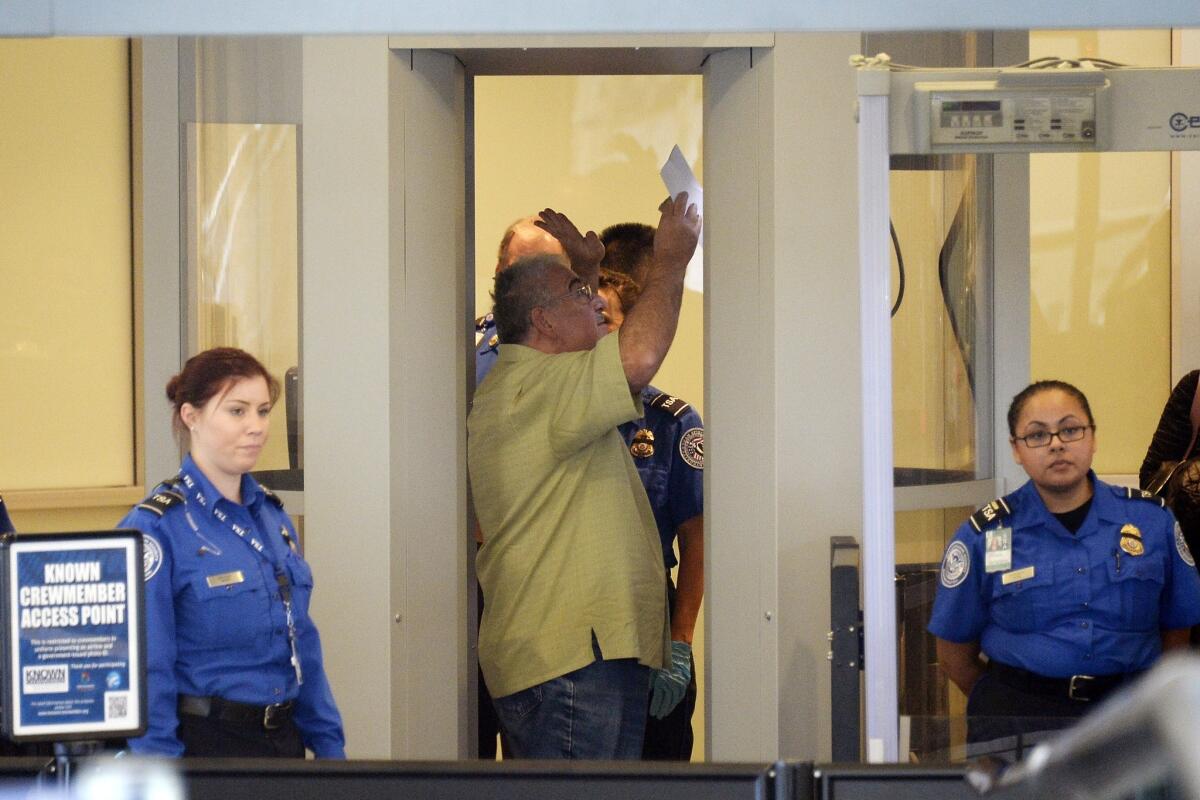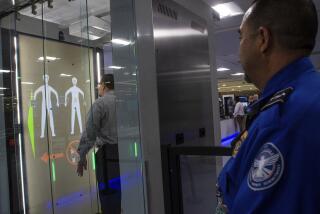On the Spot: A new knee, a new reason to hate airport screenings

- Share via
Question: Each year half a million knee replacements are done in this country, and almost as many hip replacements. These metal implants almost always set off the alarm in the screenings (I know). But the screening of a traveler with an implant is quite variable. Why doesn’t the Transportation Security Administration have a standard exam for us “bionic” travelers?
R. E. Berg
Newport Beach
Answer: We’ve criticized the TSA for treating all of us as potential evildoers, and in an interview in December 2013, TSA administrator John Pistole said the agency was moving away from its one-size-is-the-right-size philosophy. “The vast majority of the people traveling … just want to get from Point A to Point B safely,” he said. “They are not terrorists.”
In the last few months, we’ve seen a range of new screening initiatives to address some of the more obvious issues. Kids younger than 12 and adults older than 75 now don’t have to do the same samba at airport check-in as the rest of us. Returning service personnel who have been injured may qualify for expedited screening. PreCheck passengers, who have been approved through an application and interview process, also don’t have to do the hand-baggage shuffle. Those fliers are among the 1.8 million who are screened each day.
As TSA continues to slice the pie thinner and the 75 million baby boomers (the oldest ones turn 68 this year, the youngest 50) age, there one day may be a screening procedure for those people with replacement parts.
That day probably won’t come until TSA uses uniform screening technology. When you go through airport security, sometimes you get the metal detector and sometimes you get the imaging machine. The former is more apt to sound the alarm for people with artificial joints, so if it’s an option, choose the imaging machine. If it’s not an option, you might want to take preemptive measures and ask for the pat-down, which you’ll probably receive anyway if you set off the metal detector.
On its website, TSA has a page called “Travelers With Disabilities and Medical Conditions” (www.lat.ms/1bsS3FM), and it covers a range of issues.
What if you can’t lean over to take off your shoes? You may be able to stay seated and get screened that way, it says. An internal medical device such as a pacemaker? You shouldn’t be screened by a metal detector but, instead, by an imaging machine or by a patdown, the website says. If your child has a disability? He or she “can be screened without being separated from their parents or guardians. Parents or guardians should inform the officer conducting the screening of the child’s needs before screening begins. Parents or guardians may offer suggestions on the best way to approach and screen their children.”
TSA also offers a card that you can print at home (www.lat.ms/1eedy0p) that allows you to describe your issue. Many people think that if they have such a card, they get to skip screening, but this is no get-out-of-jail-free card. You still must be screened; the card merely allows more discretion when you’re dealing with a TSA agent. Instead of shouting what your issue is, the screener can take note and presumably use the appropriate protocol.
If you have questions about screening, you can contact TSA Cares at (855) 787-2227, which serves passengers or their family members with disabilities. TSA operates 5 a.m. to 8 p.m. Pacific time Mondays through Fridays and 6 a.m. to 5 p.m. weekends and holidays. Those who are hearing-impaired should email [email protected] or use a relay service.
Have a travel dilemma? Write to [email protected]. We regret we cannot answer every inquiry.
More to Read
Sign up for The Wild
We’ll help you find the best places to hike, bike and run, as well as the perfect silent spots for meditation and yoga.
You may occasionally receive promotional content from the Los Angeles Times.







